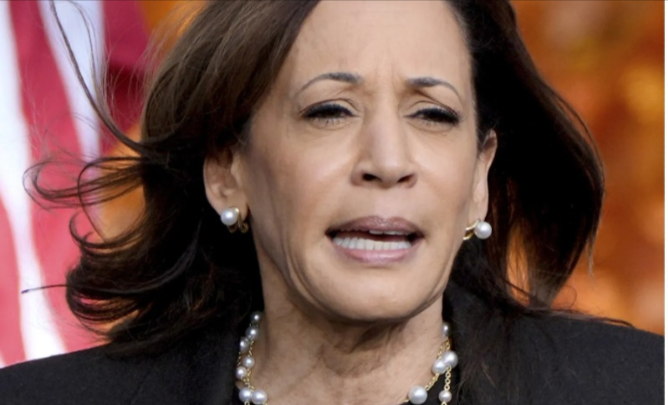Forecaster Who Backed Kamala Harris Now Says Trump Set for Landslide

A top election analyst who once predicted that Vice President Kamala Harris would win by a large margin now says that former President Donald Trump will prevail.
Thomas Miller, a data scientist known for accurately forecasting the 2020 presidential election, initially projected a Harris win in 2024. In September, he told Newsweek that his model indicated the Democrat would likely secure over 400 electoral votes.
Now, however, Miller’s model, which is based on betting odds rather than poll data, indicates that Trump is the frontrunner. According to the latest estimate, Republicans could achieve as many as 345 Electoral College votes, as Newsweek reported.
Newsweek has outlined what a 345-electoral-vote victory for Trump might look like. According to FiveThirtyEight, this scenario would involve Trump taking all the states where Harris currently leads by less than ten points, including those in the South and Midwest.
Miller's model first pointed to a slim Trump victory on October 7, as betting odds started to shift in his favor.
Unlike typical forecasting models that rely heavily on survey data, Miller’s approach emphasizes betting odds and “fundamentals” — historical election trends — to create a balanced projection. Miller uses data from the betting platform PredictIt to fuel his 2024 election predictions, the same source that guided his accurate 2020 call.
However, as of October 20, Miller noted on his website that “technical and fundamental analyses are not in alignment.” This means that while historical trends hint at a Democratic win, current betting odds favor Trump.
Although polls show a close race, betting markets still lean towards Trump. For instance, Polymarket odds currently give Trump a 60.3% likelihood of winning nationwide, compared to Harris’s 39.7% chance.
While betting odds have accurately predicted presidential winners in the past, they differ from polls in that they don’t rely on representative samples, which may increase the margin for error.
Miller acknowledged to Newsweek that he adjusts his model for potential biases, which currently lean toward Trump.
“Prediction markets have a Republican bias,” Miller noted. “We evaluated the extent of this bias in 2020 and adjust for it in our model. However, the exact level of Republican bias in the 2024 prediction markets remains unclear. We are conducting studies across these markets to gain more insight into this bias for the upcoming election.”
While Miller’s recent projections show slightly better odds for Harris, she is still trailing.
On October 26, the model suggested that Harris would only secure 171 Electoral College votes, the lowest for a candidate since Senator Bob Dole’s 1996 Republican bid.
“The 2024 presidential race has shifted from a toss-up to a Republican landslide, back to a toss-up, then a potential Democratic landslide, and again to a toss-up before leaning once more toward a Republican landslide,” Miller said.
“There is still a possibility that prediction markets and election forecasts could shift again in the final weeks before the November 5 election. We anticipate increased trading and high volatility in the final week,” Miller added.
Since 1980, there have been 11 U.S. presidential elections, and only in 2016 did the winning candidate have worse odds than the losing candidate. In that case, neither betting markets nor polls anticipated Trump’s victory.
CNN's senior data reporter Harry Enten cited various factors on Wednesday that suggest Trump is well-positioned to defeat Harris.
Trump and Harris remain in a close race, with Trump leading in six out of seven key battleground states, according to RealClearPolitics averages.
On “CNN News Central,” Enten highlighted several factors favoring Trump, including public dissatisfaction with the nation’s direction, President Joe Biden’s unpopularity, and high Republican voter registration.
“Only 28% of Americans think the country is heading in the right direction,” Enten remarked. “To put this in context, the average public approval rating when the incumbent party loses is 25%.”
“That 28% looks very much like that 25%, and nothing like the 42% we see when the incumbent party wins,” he continued. “In short, very few Americans believe the country is on the right track, which historically aligns more with a loss for the incumbent party.”
Enten also mentioned that Biden’s low approval rating could be a negative indicator for Harris, as presidents with net negative ratings are typically not succeeded by candidates from their own party.
“In reviewing history, there’s no instance where only 28% of Americans believed the country was on the right track, and the incumbent party still won,” Enten explained. “The incumbent party always loses under these circumstances.”
He added, “We don’t know yet if Kamala Harris will follow Biden, but look back to 2008: George W. Bush’s approval rating was low, and no Republican succeeded him. In 1968, Lyndon B. Johnson faced similar numbers, and a Democrat didn’t follow him. In 1952, Harry Truman’s ratings were also down, and again, the incumbent party lost.”